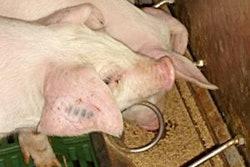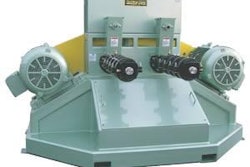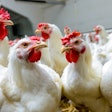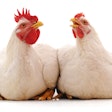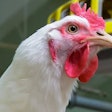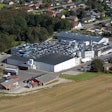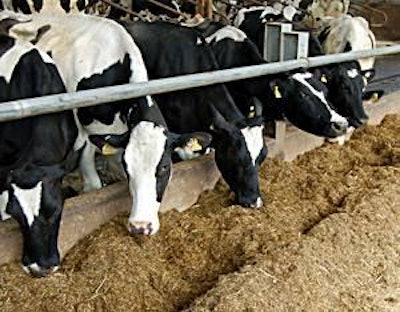
For UFAC-UK, it all comes down to R&D. The company’s strong commitment to research and development allows it to provide farmers with the best possible rations. Such a commitment is allowing the specialist animal feed company to remain a leader in the competitive international market. And in Britain, UFAC-UK manufactures and supplies the largest range of specialist animal feed products in the country.
UFAC-UK has been supplying specialist feed supplements to the livestock industry around the world for the past 30 years and its intense focus on Omega 3 fatty acids in animal diets, for example, is allowing it to continue to expand in Africa, Asia and the Middle East, where it even provides special rations for racing camels.
The company is headed by genial managing director Robert Jones, who led a management buy-out in 1981, when UFAC (France) withdrew from the UK, and has since bought out his partners.
He is currently setting up agents and distributors in South Africa, where the company is set for growth, “because there are great opportunities in the dairy sector there”.
Long-term plans include South Africa
He even has long-term plans to set up a new feed mill in South Africa which, he says could then provide specialist animal feeds across the country, as well as other markets in Africa, the Middle East and India. However, he adds the rider that this could only happen “if the political conditions are right”.
Sitting in his office in Newmarket – famous the world over for its thoroughbred racehorses – Jones says business is remarkably buoyant at the moment, both in the UK (which is still responsible for 60% of the company’s trade) and overseas, where he still sees huge potential for growth, especially for specialist feeds that will boost yields and, most importantly, he believes, fertility.
“We have done a lot of work with Omega 3 fatty acids at our UK mill near Oakham in Rutland, with remarkable results in dairy cows. Not only do they help enhance the productive processes, they also increase resistance to disease and improve both the quality and quantity of milk yields.”
As far as meat-producing animals are concerned, Jones claims that his company’s specialist feed supplements help enrich the fat in cuts to improve human nutrition.
He adds that the company’s nutritionists, led by UFAC-UK technical manager Francis Palmer, have also done a lot of work involving a variety of liquid fats, oils, glucose and molasses for blending and combining with dry base material and minerals to produce feeds and pre-mixes.
Ingredients are sourced from around the world on the basis of quality and value, but all the work is still done in the UK, where the company has worked closely with ADAS (the British government’s former national advisory service) and other independent consultants to develop new products.
“R&D is a vital element of our business,” says Jones. “I like to think of us as the leaders, rather than the followers, as far as innovation and the development of new products are concerned.”
He also claims that UFAC-UK has helped uncover some of the secrets of fishmeal oils and vegetable proteins to get the best feed values for all species.
The company also offers its customers a total package that includes ration formulations and advice on nutrition and feeding.
Home mixed market is place to be
“The home-mixed market is the place to be at the moment. It is growing rapidly wherever you go. We specialise in looking at what livestock farmers have in terms of feed and then we provide them with those vital extra supplements (about 10% of the animals’ diet) to help them get the best they can out of their home-grown feeds.”
This philosophy is followed both at home as for exports, where Jones says his company looks to maximise what the country can produce, be it eggs, meat, or milk for the best prices.
He points out that the company has developed particular expertise in the feeding and nutrition of animals in very hot climates, where temperatures can soar to over 50C.
Under these conditions the diets have to be particularly palatable and of a high nutrient density to maintain feed intake and meat, milk and egg yields. In several areas, diets also have to be balanced to account for soil deficiencies.
The company’s expertise in catering for the special needs of these animals and its connections to countries in hot climates has also led it to develop diets to satisfy demands for feed supplements for some more exotic species, such as ostriches, bison, wildebeest and deer in game parks and zoos around the world.
Aware of the current focus on the environment and fears of global warming, Jones says his team of nutritionists is also looking at how it can help livestock farmers reduce their carbon footprints, while still ensuring their animals receive all the right nutrients and minerals.
Work on reducing methane
“We are currently working towards developing products to help reduce the methane production problems in ruminants,” says Jones. “We are also working on diets for pigs to reduce the ammonia content of pig slurry. It is not too difficult to do, but we have to ensure that whatever we develop will provide cost-effective results for farmers.”
Asked about the challenges facing his company – and the industry – Jones says that there are potential difficulties regarding the political situation in various countries.
“However, I believe we will remain successful and competitive at home and abroad, because we are a small company and light of foot – we can make decisions quickly. We also believe in face-to-face contact whenever possible. You cannot beat it, even though it does mean a lot of travelling.”
As far as the future is concerned, Jones sees good expansion prospects in the UK, as more producers have moved to home-mixing and total mixed rations (TMRs), as well as plenty of opportunity abroad, where there are a multitude of countries that the company is yet to approach.
“There is also enormous potential in Vietnam and India, for example. I just wish I was 30 years younger and had a lot of money, because the feed industry is ripe for rationalisation.”



